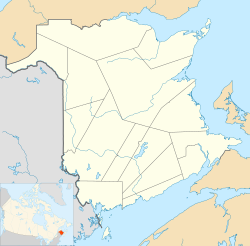Shippagan
| Shippagan | |
|---|---|
| Town | |

The Marina in Shippagan
|
|
| Location within New Brunswick. | |
| Coordinates: 47°44′38″N 64°43′04″W / 47.743889°N 64.717778°W | |
| Country | Canada |
| Province | New Brunswick |
| County | Gloucester |
| Parish | Shippagan |
| Founded | 1790 |
| Government | |
| • Type | Town Council |
| • Mayor | Tilmon Mallet |
| Area | |
| • Total | 9.94 km2 (3.84 sq mi) |
| Population (2011) | |
| • Total | 2,631 |
| • Density | 264.7/km2 (686/sq mi) |
| • Pop 2006-2011 |
|
| • Dwellings | 1,199 |
| Time zone | AST (UTC-4) |
| • Summer (DST) | ADT (UTC-3) |
| Postal code(s) | E8S |
| Area code(s) | 506 |
| Website | www |
Shippagan (2011 population: 2,631) is a Canadian town in Gloucester County, New Brunswick.
Shippagan is located in the northeastern part of the Acadian Peninsula: a combination bridge-causeway connects the town with Lamèque Island to the northeast.
The peninsula is approximately 5 km (3 miles) long and at maximum 5 km (3 miles) wide, bordered on the north-west by , to the north by Shippagan harbour to the east by the Gulf of Saint Lawrence and to the west by .
Approximately 99% of the town's residents are Francophone.
The town was founded by the Duguay family, from Paspébiac, Quebec, in 1790. Acadian settlers later joined them. Its location was an ideal spot for exporting timber from further inland, as well as fishing. There are also numerous peat bogs in the area.
Shippagan is home to campuses of the Université de Moncton and New Brunswick Community College.
The name originates from the Mi'kmaq Sepagun-chiche, which roughly translates as "Ducks' transit route". This name described the immediate region rather than the specific location of the current settlement that inherited the name.
Different spellings have been applied over the years. None of the earliest known francophone explorers such as Jacques Cartier, Samuel de Champlain and Nicolas Denys mentions the name Shippagan, which appears in writing for the first time only in 1656 when Ignatius of Paris, a Capucine missionary, wrote to his superiors recommending the establishment of four or five missionary posts, one of which he called "Cibaguensi", a Latinised form of Shippagan.
...
Wikipedia

